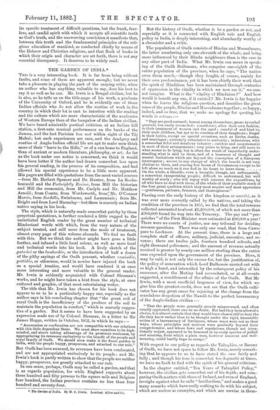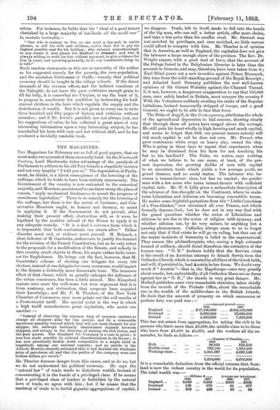THE GARDEN OF INDIA.* THIS is a very interesting book.
It is far from being without faults, and some of them are apparent enough ; but we never take a pleasure in playing the part of the carping critic, when an author who has anything valuable to say, does his best to say it as well as he can. Mr. Irwin is a Bengal civilian, but he is also, as he tells us on the title-page of his work, a graduate of the University of Oxford, and he is evidently one of those Indian officials who do not allow the routine of work in the country in which their lot is cast to interfere with the reading and the culture which are more characteristic of the academies of Western Europe than of the bungalow of the Indian civilian. We have heard admirable poetical criticism at an Indian hill station, a first-rate musical performance on the banks of the Jumna, and the last Parisian bon mot within sight of the Taj Mahal; but such experiences are rare, and the drudgery and routine of Anglo-Indian official life are apt to make men think more of their " leave to the Hills," or of a run home to England, than of ancient or modern literature, philosophy, or art. As far as the book under our notice is concerned, we think it would have been better if the author had drawn somewhat less upon his general reading, in the process of its composition, and had allowed his special experience to be a little more apparent. His pages are filled with quotations from the most varied sources —from Mr. Herbert Spencer and Dr. Hunter, from La Roche- foucauld and the Fortnightly Review, from Mill the historian and Mill the economist, from Mr. Carlyle and Mr. Matthew Arnold ; from Comte, from Wordsworth, from:Mr. O'Connor Morris, from Bordello, Swinburne, and Lamenuais ; from Mr. Bright and from Lord Macaulay—but there is scarcely an Indian motive saying in his book.
The style, which is naturally made somewhat patchy by these ;perpetual quotations, is further rendered a little rugged to the uninitiated English reader by the great number of technical Hindustani words with which, from the very nature of the subject treated, and still more from the mode of treatment, almost every page of this volume abounds. We find no fault with this. But we think the author might have gone a little further, and infused a little local colour, as well as mere local and technical words into his book. A lively sketch of the loaturciri or the luntherdeir, or the introduction of half a dozen of the pithy sayings of the Oudh peasant, whether zarninddr, yattiddr, or otherwise, would in nowise have injured the book as a special treatise, and would have rendered it at once more interesting and more valuable to the general reader.
Mr. Irwin is evidently acquainted with Colonel Sleeman's works, and he might have taken a hint from the style, at once cultured and graphic, of that most entertaining writer.
The title that Mr. Irwin has chosen for his book does not appear to us to be a particularly happy one, especially as the author says in his concluding chapter that "the great evil of rural Oudh is the insufficiency of the produce of the soil to maintain the population in comfort," which is scarcely sugges-
tive of a garden. But it seems to have been suggested by an expression made use of by Colonel Sleeman, in a letter to Sir James Hogge, written in October, 1852, in which he says :--
" Annexation or confiscation are not compatible with our relations with this little dependent State. We must show ourselves to be high- minded, and above taking advantage of its prostrate weakness, by appropriating its revenues exclusively to the benefit of the people and royal family of Ondh. We should soon make it the finest garden in India, with the people happy, prosperous, and attached to our rule."
But Ondh has been annexed, its revenues have been confiscated, and are not appropriated exclusively to its people ; and Mr. Irwin's book is partly written to show that the people are neither happy, prosperous, nor greatly attached to our rule.
In one sense, perhaps, Ondh may be called a garden, and that is as regards population, for while England supports about three hundred and fifty persons to the square mile and Belgium four hundred, the Indian province contains no less than four hundred and seventy-four.
* The Garden of India. By H. C. Irwin. Londonl: Allen and Co.
But the history of Oudh, whether it be a garden or not, and especially as it is connected with English rule and English policy in India, is deeply interesting, and abundantly worthy of a chronicler and a critic.
The population of Oudh consists of Hindus and Mussulmans, the latter numbering only one-eleventh of the whole, and being more influenced by their Hindu neighbours than is the case in any other part of India. What Mr. Irwin can mean in speak- ing of the Oudh Brahmans, who comprise one-eighth of the entire population of the province, when ho says, " The nation owes them much,—though they fought, of course, mainly for their own predominance, yet it has been chiefly their work that the spirit of Hinduism has been maintained through centuries of oppression in the vitality in which we now see it," we can- not imagine. What is the " vitality of Hinduism ?" And how would it benefit any one, if it existed ? Mr. Irwin is far happier when he leaves the religions question, and describes the great mass of the people, Hindus and Mussulmans together ; so happy, indeed, and so true, that we make no apology for quoting his words in cameo :—
" They are good-natured ; honest among themselves; prone to verbal quarrels, but easily reconciled ; considerate, after their own fashion, in their treatment of women and the aged ; careful of and kind to, their male children, but apt to be careless of their daughters ; frugal in their habits, except on special occasions, such as births, deaths, and marriages ; extremely submissive to authority ; industrious, with a somewhat fitful and desultory industry ; careless and unsystematic in most of their arrangements ; very prone to lying, and still more to what seems to be lying, but is often the result of imperfectly under- standing what is said to them, and of a looseness of thought and mental limitations which are beyond the conception of a European interrogator ; averse to any change of which the benefit is not very obvious to them, and craving few boons of Government except to be
left alone as much as it can find in its heart to leave thorn On the whole, a likeable, even a loveable, though, not nnfrequently, a somewhat exasperating people; difficult to understand, but well worthy of study ; who will repay with interest the expenditure, by all who have to deal with them, of the whole of their available stock of the four great qualities which they most require and most appreciate —gentleness, patience, firmness, and thoroughness."
Passing over the early history of the kingdom or nawdbi, as it was ever more correctly called by the natives, and taking the
condition of the province in 1855, we find that the total revenue collected amounted to about £1,200,000, of which not more than £300,000 found its way into the Treasury. The pay and " per- quisites " of the First Minister were estimated at £80,000 a year There were no courts of justice, nor any tribunal for deciding revenue questions. There was only one road, that from Cawn- pore to Lucknow. At the present time, there is a largo and complete staff of officers, military, judicial, executive, and re- venue ; there are twelve jails, fourteen hundred schools, and eight thousand policemen ; and the amount of revenue actually received is greater by nearly one million sterling than the entire sum expended upon the government of the province. Here, it may be said, is not only the excuse for, but the justification of, the policy of annexation which Lord Dalhousie carried out with so high a hand, and intensified by the subsequent policy of his successor, after the Mutiny had necessitated, or at all events suggested, a resettlement of the affairs of the Oudh. But Mr Irwin, with a most unofficial largeness of view, for which we give him the greatest credit, does not see that the Oudh culti- vator has any great cause for rejoicing at the change from the scandalous despotism of the Nawab to the perfect bureaucracy of the Anglo-Indian civilian :—
" That the people were generally grossly misgoverned, and often cruelly oppressed, there can be no doubt. But had they been allowed a choice, it is almost certain that they would have chosen still to bear the ills they knew rather than to be brought under the rigid, irresistible action of a bureaucracy of foreigners, whose ways were not as their ways, whose principles and motives were generally beyond their comprehension, and whose laws and regulations, though not inten- tionally unjust, appeared to bo hemmed in by every species of pitfall and mantrap, from which a plain man, however innocent and well- meaning, could hardly Lope to escape."
With respect to our policy as regards the Taluqdars, or Barons of Oudh, we have not space to follow Mr. Irwin, merely remark- ing that he appears to ns to have stated the case fairly and fully ; and though his tone is somewhat too dogmatic at times, we have no fault to find with the spirit of his general criticism. In the chapter entitled, " Ten Years of Taluqdfiri Policy," however, the civilian gets somewhat out of his depth ; and com- paring Oudh matters with those of Ireland, and even of England, inveighs against what he calls " landlordism," and makes a good many remarks which have really nothing to do with his subject, which are useless as examples, and which are unwise in them- selves. For instance, be holds that the " ideal of a good tenant cherished by a large majority of landlords all the world over"
is, mutatis mutandis,— " One who is content to live on one meal a day and, in native phrase, to sell his wife and children, rather than fail to pay the highest possible rent for his holding; who submits unquestioningly to any ceases it may please his landlord to demand ; and who is always willing to work for him without payment, to give evidence for him in court, and speaking generally, to do any conceivable thing he is told."
Such random statements as this are as unworthy of the author as his suggested remedy for the poverty, the over-population, and the mistaken Settlement of Ondh,—namely, that political economy should be taught in the village schools. If the direct demands of the revenue officer, and the indirect exactions of the Taluqdfir, do not leave the poor cultivator enough grain to fill his belly, it is somewhat too Utopian, to say the least of it, to propose to ameliorate his condition by instructing his half- starved children in the laws which regulate the supply and the distribution of wealth. But it is not given to every one to write three hundred and fifty pages of history and criticism without mistakes ; and if Mr. Irwin's parallels are not always just, nor his suggestions of value, he has collected a great mass of very interesting information upon a very interesting subject, he has marshalled his facts with care and not without skill, and he has produced a decidedly readable book.















































 Previous page
Previous page